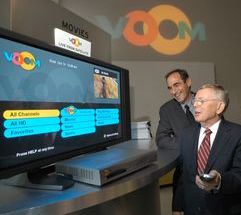Charles Dolan Takes Stand in Voom Trial
The smarter way to stay on top of the multichannel video marketplace. Sign up below.
You are now subscribed
Your newsletter sign-up was successful

New York – Cablevision Systems chairman and Voom HD founder Charles Dolan took the witness stand Monday in the ongoing breach of contract trial against EchoStar Communications, fielding questions for more than two hours and hammering home the point that the channels would have thrived if they weren’t unceremoniously dumped by the satellite giant.
EchoStar, now Dish Network, had agreed to carry Voom’s 21 HD channels in 2005 for 15 years, but dropped the channels in 2008, just two years into the deal. EchoStar had claimed that Voom failed to invest the agreed upon $100 million annually in the service for its first five years, which Voom disputes. Voom sued EchoStar shortly after the satellite giant stopped carrying the channels. The trial, being held in New York State Supreme Court in Manhattan, is expected to last four to six weeks.
Charles Dolan, who created Voom in 2003 in an effort to capitalize on what he believed to be a burgeoning HDTV market, was the first witness to take the stand. The 86-year-old Cablevision chairman held his own, fielding questions for more than two hours and deftly handling any attempts by EchoStar’s lawyers to trip him up.
Key to the case is the definition of “service,” which both sides see as the integral component in the contract language in dispute. EchoStar has stressed from the beginning that it had the right to cancel the Voom contract if the HD programmers failed to invest $100 million annually on the “service,” which they define as only the programming provided to EchoStar. Voom has contended that “service” in terms of the contract with EchoStar means the entire Voom business, including marketing, corporate overhead and related expenses. And it claims it spent more than the required amount.
Dolan said it was his idea to include the $500 million spending requirement in the agreement, adding that the channels had been spending $100 million or more a year since inception.
“We knew what investment we needed to make in the business,” Dolan said.
Dolan contended that Voom would have become successful if EchoStar lived up to their end of the 15-year deal. At the time Voom was terminated, EchoStar had about 1.5 million HD customers (up from about 30,000 prior to the deal) and there was every indication that a large percentage of the satellite giant’s 12 million subscribers would opt for HD service.
The smarter way to stay on top of the multichannel video marketplace. Sign up below.
“There was so much momentum,” Dolan said. “We believed the package was becoming more attractive.”
But as the Voom relationship wore on, other programmers were simulcasting their standard-definition channels in HD and making them available for free. EchoStar found itself at a disadvantage as rivals like DirecTV were offering more HD channels at a much lower cost.
In cross-examination, Dolan said that “service” is a somewhat loose, interchangeable term in the industry, but added that he knew of no other instance where a programmer could provide a service by only investing in programming.
“I wouldn’t know how to do that,” Dolan said. “Every business has so many aspects.”
Judge Richard Lowe admonished attempts by EchoStar’s attorneys to move the conversation towards some of the more controversial aspects of Voom – Dolan’s son Cablevision CEO James Dolan had opposed of spending on the service which led to some highly publicized battles between the two and the company’s board of directors. After several requests to approach the bench by Voom’s attorneys, Lowe’s patience had reached the limit.
“There are two issues in this case and two issues only: whether $100 million a year was spent the way it was supposed to be spent and what the definition of service is,” Lowe said. “I don’t care about the internal workings of Cablevision. I don’t care if the board was up in arms. The objective I want is having this jury determine if Cablevision spent the $100 million pursuant to the contract, or they did not.”
